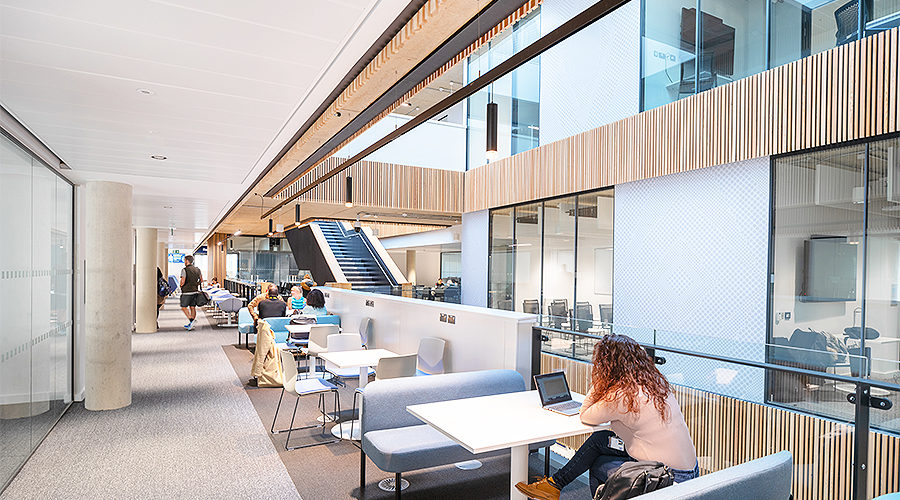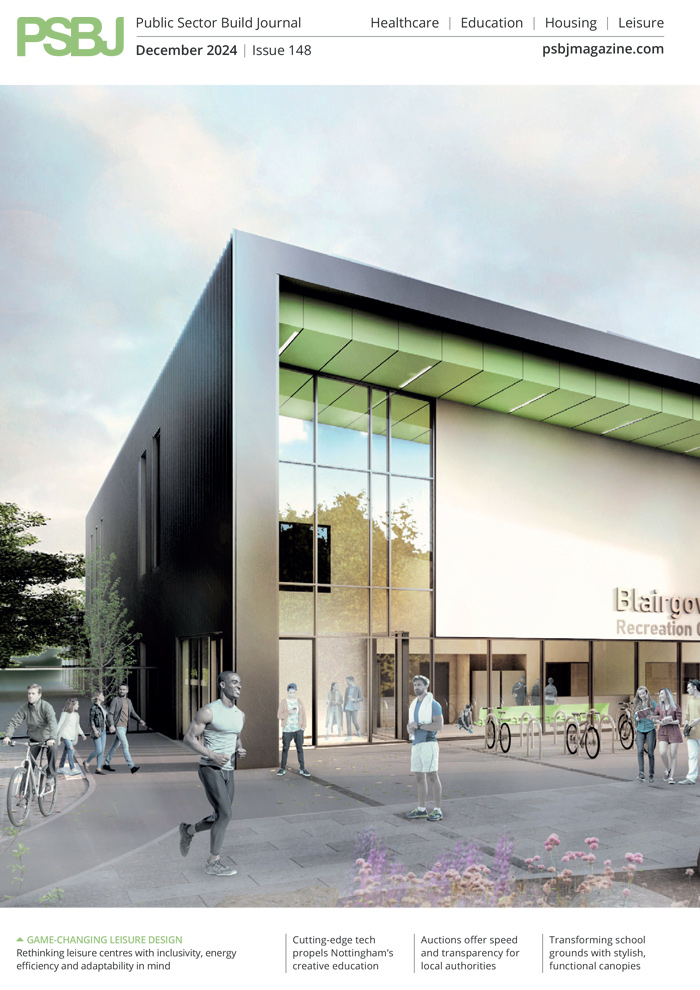Universities have a critical role to play in levelling up. They provide hubs of learning, research and community for local regions, offering opportunities for people to flourish. However, there are challenges around accessibility and uptake, particularly for those from lower socioeconomic backgrounds and some ethnic minorities.
MCW Architects
Peterborough, a city in the East of England, is considered a ‘higher education coldspot’ and is in the top 100 most deprived constituencies in the country, with 25% of children in the city living in relative poverty – significantly higher than the national average of 20%. The region is also in the bottom 10% for skill levels.
After decades of sluggish growth, a new anchor institution was needed. Peterborough required an academic space and community heart that could provide the confidence and economic uplift to usher in a new era for the city.
Created through a three-way partnership between the Cambridgeshire & Peterborough Combined Authority (CPCA), Peterborough City Council (PCC) and Anglia Ruskin University (ARU), ARU Peterborough, designed by MCW architects, is quickly becoming a catalyst for transformation and providing greater access to higher education for underserved populations in this region.
Designing in social mobility
MCW architects worked with a visionary brief from the clients, which emphasised the importance of true accessibility for the public and student body alike. Design wise, this led to unprecedented openness and visibility – with glass walls between teaching facilities, an open atrium (with no barriers) and a public cafe, giving Peterborians a glimpse into university life that may well set them on the path to considering higher education. The building, clustered around an informal learning heart, simultaneously accommodates flexible teaching, breakaway areas and quiet study space – acknowledging different needs, including those of neurodiverse students.
The ‘openness’ of visible sightlines across its deep plan, centred around a triple-height atrium, speaks to the hybridity of the academic and social space. It’s inspired by pedagogical theory that encourages lecturers to continue the conversation outside the classroom.
This accessibility, as ARU Peterborough Principal Professor Ross Renton has noted, is key to public engagement: If those walking past the campus can glance to see the exciting and innovative activity going on, as well as the excellent facilities, it might take them a step closer to enquiring about courses themselves. “Universities are public facilities, and nobody should be turned away at the door. In fact, it is incumbent on universities – it should be part of their civic mission – to be welcoming and open spaces, which are rooted in the local community.”
The policy of ‘opening the door to the community’ extends to the campus’ external landscape. ARU Peterborough’s outdoor space allows for the hosting of public events, further encouraging public members to engage with the university. Its rain gardens and diverse plant species mean the scheme not only enhances biodiversity but also provides unique educational opportunities for students.
On the other side of the public plaza, a state-of-the-art extended reality suite allows images and videos to be projected onto the walls and floors; showing everything from how a student’s self-developed game might come to life to simulating the pressurised environment of a hospital ward.
Rather than more traditional ‘chalk and talk’, the suite is ushering in pedagogical methods fit for the modern age, offering news ways of engaging students.
Looking forward
The university’s strategic central location in Peterborough, one of the UK’s fastest-growing economies, amplifies its economic impact. With University House and the Peterborough Innovation and Research Centre completed and the construction of Phase 3, a £30m CLT (cross-laminated timber) science centre called The Lab set to be handed over to the university this summer, Peterborough now has the perfect facilities to inspire both students and members of the community.
ARU’s numerous recent accolades, including being named Times Higher Education University of the Year 2023, highlight its commitment to excellence and innovation. However, ARU Peterborough’s significance extends beyond academic achievement, with ARU Peterborough playing a key role in ARU receiving the University of the Year title at the prestigious UK Social Mobility Awards in 2023, showing the impact the city’s new university is already making. Around half of all applications are already coming from local PE postcodes, highlighting ARU Peterborough’s early success in dismantling barriers to higher education, particularly for individuals from non-traditional backgrounds.
ARU Peterborough’s campus design, which is inclusive and welcoming to all, is also serving as a case study of social sustainability and architectural excellence, with the first phase shortlisted for both the RICS Community Benefit Award 2024 and the AJ Architecture Awards 2023, and helping MCW architects win Building Design’s Higher Education Architect of the Year Award 2023.
As ARU Peterborough continues to expand its footprint and refine its educational model, the university remains devoted to enhancing higher skills, creating knowledge and promoting inward investment. By offering a blend of on-campus education, distance learning, in-work training and apprenticeships, the new university is making higher education accessible to a much wider audience.
In doing so, it is not only transforming individual lives but also triggering positive economic and social changes, propelling Peterborough towards a future defined by inclusivity, prosperity and opportunity.


















